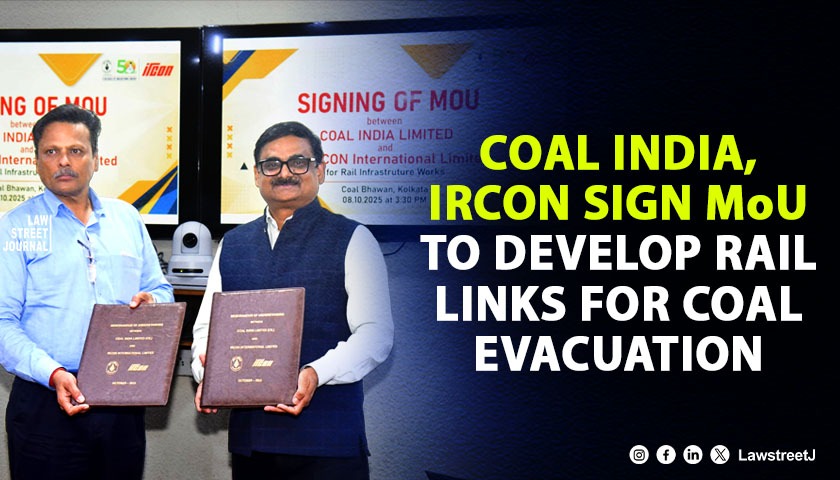New Delhi: Coal India Limited (CIL) has signed a memorandum of understanding (MoU) with Indian Railway Construction International Limited (IRCON) to strengthen rail infrastructure for coal movement across key mining regions. The agreement, signed on October 8, 2025, focuses on improving connectivity between coalfields and major consumption points to ease supply constraints. The initiative is part of the Ministry of Coal’s plan to expand logistics capacity and improve transport efficiency. It follows a similar understanding between CIL and Konkan Railway Corporation Limited (KRCL) in August 2025 aimed at enhancing coastal and inter-state connectivity.
Coal India, a Maharatna company under the Ministry of Coal, produces more than three-fourths of the country’s coal. Efficient transportation is vital to meeting energy needs, as thermal power continues to supply more than half of India’s electricity, according to the Central Electricity Authority’s August 2025 report. Under the new MoU, CIL and IRCON will work together to plan and develop rail corridors, sidings, and last-mile links in coal-rich states such as Jharkhand, Odisha, Chhattisgarh, and Madhya Pradesh. These regions have long faced logistical bottlenecks, often causing dispatch delays and cost escalations.
The Ministry of Coal’s Annual Performance Review for 2024–25 noted that Coal India dispatched nearly 700 million tonnes of coal during the year, with around 65 per cent transported by rail. Existing routes continue to face congestion, and several coalfields remain without direct rail access. The new collaboration will aim to ease these challenges through joint surveys, land coordination, and project execution.
A joint working group with representatives from both companies will oversee planning and implementation. The group will also identify potential routes where rail infrastructure can be expanded or upgraded.
Legal Structure and Implementation Framework
The MoU between CIL and IRCON is non-binding and provides a base for future legally enforceable projects. It covers technical and financial assessments, feasibility studies, and project prioritisation. Both public sector undertakings will ensure compliance with the Companies Act, 2013, and the General Financial Rules, 2017, for all projects undertaken under the partnership. Any joint venture or special purpose vehicle formed under this arrangement will require board approval and, where applicable, clearance from the Cabinet Committee on Economic Affairs (CCEA).
The Ministry of Coal has stated that projects will be executed in line with the Coal Bearing Areas (Acquisition and Development) Act, 1957, and the Right to Fair Compensation and Transparency in Land Acquisition, Rehabilitation and Resettlement Act, 2013. These provisions ensure lawful land acquisition and fair compensation for affected families. Officials said the MoU will lead to detailed project reports and specific contracts once feasibility studies are completed. The agreement allows both PSUs to jointly or separately take up work depending on the scale and funding model of each project.
Link to National Infrastructure and Energy Plans
The initiative aligns with the National Logistics Policy (NLP) launched in 2022, which seeks to reduce logistics costs from the current 13–14 per cent of GDP to below 10 per cent by 2030. Rail-based coal movement forms a central part of this policy, offering cost and environmental advantages over road transport. It also supports the PM Gati Shakti National Master Plan, which focuses on integrating transport and energy infrastructure across ministries.
The partnership is expected to use IRCON’s construction expertise and CIL’s operational scale to develop critical freight corridors in the coal supply chain. CIL’s earlier MoU with Konkan Railway focused on coastal connectivity for coal imports and inter-state transport. The new understanding with IRCON targets inland transport from domestic coalfields, complementing the previous collaboration.
According to the Coal Vision 2030 document released by NITI Aayog and the Ministry of Coal, India’s coal demand may reach around 1.2 billion tonnes by 2030. Expanding rail networks and ensuring efficient evacuation from mines are seen as key to meeting this growing requirement. Feasibility studies under the CIL–IRCON agreement will begin shortly, focusing on high-volume corridors. Both companies will review project progress with the Ministry of Coal and the Ministry of Railways to ensure adherence to financial and environmental regulations.
The MoU between Coal India and IRCON marks another step in strengthening India’s coal transport network through coordinated rail infrastructure development. While the agreement does not create immediate legal obligations, it lays the groundwork for future projects aimed at improving supply efficiency and supporting the country’s energy and logistics goals.








Gaurisha Oct 10, 2025
This is a great strategic move by Coal India. Partnering with IRCON to develop dedicated rail infrastructure will address the long-standing issue of coal transportation bottlenecks. It's a forward-thinking approach to ensure smoother and more efficient coal evacuation, which is crucial for meeting the country's energy demands. This collaboration has the potential to significantly improve the entire coal value chain, from mine to end-user, and contribute to a more reliable power supply.